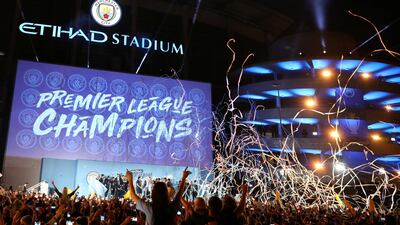It’s April 10, 1982 and there are eight games left in the English football season. Liverpool have just taken control of the title race, having beaten Manchester United at Old Trafford midweek, displacing high-flying Ipswich Town at the top of the table. Now, the Merseysiders are returning to Manchester to play City on a sunny Saturday afternoon.
The home team had their own title aspirations earlier in the season, sitting second in December 1981 after beating Liverpool 3-1 at home on Boxing Day.
That defeat left Liverpool a distant 12th in the league and the side’s quest to regain the title looked to be over. How wrong that assessment proved to be. The loss stung the Reds into action, who won 13 of their next 15 games.
City’s season also turned on that victory at Anfield, albeit in the opposite direction. By April, they were sitting mid-table and stuck in a seven-game winless streak.
Liverpool tore City apart that spring day at Maine Road, winning 5-0. Their fitness and focus stood in marked contrast to the home team, who looked clouded with self-doubt. City were relegated at the end of the following season.
What most observers took away from that game was that Liverpool’s era of dominance, now in the hands of a much younger group of players, looked set fair for years to come.
What was impossible to predict was that the club’s stranglehold on the league title – Liverpool won 10 titles in 15 years, including 1982 – would come to an abrupt end in 1990 and an agonising and, as yet unfulfilled, 30-year battle for another would begin.
Today, it is Manchester City who appear to have a tight grip on the Premier League title.
On Sunday, they wrapped up back-to-back league titles – their fourth in eight seasons. Despite having won this year's title by a single point, some now believe Pep Guardiola's side to be beyond reach. The club has been under Abu Dhabi ownership for almost 11 years.
City appear to have a common purpose from top to bottom, although it is easy to make such observations when a side is collecting multiple pieces of silverware. They contest the FA Cup final this weekend in pursuit of a historic domestic treble.
The lesson from comparison of that humiliating early-80s defeat for City and this month’s league triumph is that history teaches us nothing about the relative shelf-life of footballing dominance.
Unanticipated obstacles feature prominently in the sport’s history, bringing down empires at unexpected moments: in Liverpool’s case, there were the twin catastrophes of the Heysel disaster and the Hillsborough tragedy, which presented the club with vast challenges.
In the example of the trophy-laden years for Manchester United under Sir Alex Ferguson, there was a lack of planning for those that came after his retirement. For Arsenal’s golden years with Arsene Wenger, a move to an expensive new stadium became a financial impediment to continued progress.
Those who seek a swift end to City's achievements no doubt hope that UEFA's Financial Fair Play investigation will derail the club. For their part, City say that they have provided "comprehensive proof" that any alleged irregularities are false. I fail to see how a case can be founded on hacked or stolen emails.
Putting that aside, those who love or admire the club must do the following. Firstly, sit back and enjoy these years of scintillating football under Guardiola, because they will, inevitably, come to an end. Secondly, I, like others, should stop looking to the past to explain the present.
My late father took me to that fateful 1982 game, and I was inconsolable in defeat as we trudged away from the ground. City were so far behind Liverpool it seemed impossible we could ever catch up. Much of the following 30 years provided a persistent and painful validation of that belief – but they did eventually bridge the gap, albeit by an unexpected route.
No one could have foreseen how thoroughly the organisation would be transformed by thoughtful new owners, and in such a way as to make historical precedent irrelevant.
Nothing from City’s decades of failure helps explain their success today, except that the team’s leadership understood the centrality of heritage in any football organisation’s DNA, and the importance of setting aside the burdens of history if you want to move forward.
And that's because great footballing sides – such as Liverpool in the 80s, United in the 90s and City today – make history. The rest of us just revel in their glory years.
Nick March is an assistant editor-in-chief at The National


